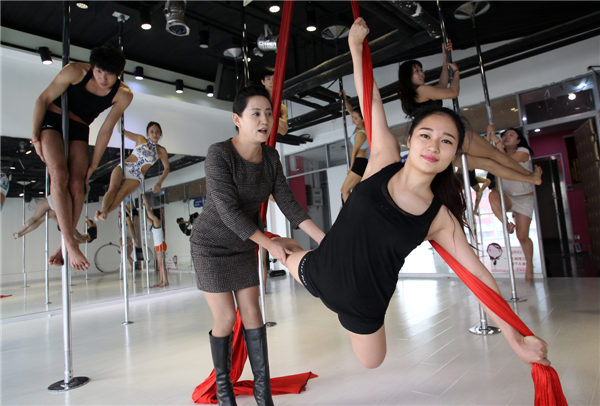Making the pole their goal
 0 Comment(s)
0 Comment(s) Print
Print E-mail China Daily, January 28, 2015
E-mail China Daily, January 28, 2015
|
|
|
Students train at the Luolan Pole Dance School in Beijing. |
Future investment
Having started in a shabby 160-square-meter gym refurbished at a cost of just 16,000 yuan ($2,570), Luo's school has now grown into a chain business with more than 20 franchised studios nationwide, earning an annual profit of more than 500,000 yuan.
For beginners, a month of classes costs 6,800 yuan, while a three-month, senior-level training program costs 16,800 yuan.
Despite the relatively high tuition costs, compared with classes in ordinary gyms, most of the students are committed to bearing the financial burden and learning the routines as an investment in their futures amid predictions of a surge in popularity.
Huang Chuan'e, from the southwestern metropolis of Chongqing, is a regular at the school. She graduated from the beginner and primary training courses in 2013, and was recently one of nine students who signed up for advanced classes.
After graduating from Chongqing Technology and Business University in July, Huang, 22, opened her own pole-fitness club in Zhongshan, Guangdong province. Now, she wants to fine-tune her skills via the course in Beijing so she can better coach her own students.
"The demand for well-trained pole-dancing talent has really soared, even in the smaller cities. More people are taking it up as exercise, or to lose weight and get a good figure, but we are short of coaches," said Huang, whose well-toned physique, including several bruises on her legs, makes her stand out in a crowd.
Driven by the nascent market demand, the wages of pole-dancing teachers, and the cash rewards they receive for commercial performances, have been rising, thus luring more young people to set a career goal on the pole.
However, the lack of a united industry association has emerged as an issue for a number of clubs and schools who are keen to form a healthy sector with unified standards and pricing policies.
"We've sensed a tendency of blind competition on low prices," said Song, who runs her own 300-square-meter studio in east Beijing's downtown. "Some shortsighted clubs only consider their own needs and offer tuition fees that are much lower than the average. That's affecting the quality of training."
National title controversy
The lack of unity in China's pole-dancing industry was highlighted by a recent series of disputes over the legitimacy of an alleged "national team" and a "national championship".
At the end of 2014, the formation of a new "national team", which will train to compete at the 2015 World Pole Dance Championships in Beijing in April, prompted heated debate about whether the title should be used by a club squad without authorization from the national governing body for sports.
Yuan Biao, the leader of the 18-strong squad and founder of the China Pole Dance Sports and Training Center in Tianjin, started sending his elite dancers, including Meng Yifan, a well-established female pole artist, to compete in the WPDC in 2012 under the title of the "Chinese national team". The move prompted complaints from rival club operators, who claimed it was a trick to attract customers by claiming a distinguished title as their own.
Li Xue'er, a pole-dancing teacher at the Aobangshangwu Dance Training Center in Beijing, said: "Foreign dancers participated in the WPDC under their own names, while Yuan gave his dancers 'national' status. It's neither fair nor reasonable."
Luo Lan was also critical of Yuan's move, saying that a team can only be called "national" if it's obtained the approval of the General Administration of Sport of China. "In China, not even the 'national champions' are exclusively organized by one entity, let alone the concept of 'national teams'," she said.
The eighth China International Pole Dance Championship was held in Beijing at the end of last year. it was jointly organized by Luo's school and the US-based International Dance Challenge as the China qualification round for the IDC finals, and featuring more than 300 dancers.
However, the China Pole Dance Championships, jointly staged by Yuan's club and the World Pole Dance Federation, is currently recognized by the Chinese authorities as the only qualification event for the World Pole Dance Championships which are authorized by the WPDF.
"Pole dancing hasn't been listed as an official sport or sports dance by the GASC, so there are no State-recognized national teams," Yuan admitted. "Because my club is authorized to host the qualification rounds of the WPDC, widely recognized as the most-prestigious pole-dancing event in the world, the dancers we drafted should be reasonably considered to be representatives of China," he added.
However, the General Administration of Sport of China denied that pole dancing would be included in its event-management system in the near future. "Although the fitness value has been widely recognized, pole dancing remains a niche event and has a limited number of practitioners," said Zhang Na, an official at GASC's mass sports administration center.







Go to Forum >>0 Comment(s)